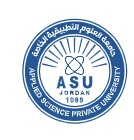Managing cultural change in higher education through research

Sponsored by

Sponsored by

At Applied Science Private University in Jordan, faculty participation is central to its ambitions of research impact
Changing the organisational culture of a higher education institution is not easy. It requires a clear vision and strategy, alongside the administrative skill to execute it. Yet, at its most basic, it is about managing people, and the Applied Science Private University (ASU) in Amman, Jordan, offers a case study of what this looks like in practice.
Over the past six years, ASU has augmented its reputation for first-class teaching with impactful research. The university’s dean of research, Mohammad Alnajjar, admits that this has not been easy, but the decision to place faculty at the centre of its strategy is bearing fruit. “If you want to have good researchers, first of all you have to spread the knowledge about the importance of research,” Dr Alnajjar says. “We started doing this via a number of seminars, workshops and newsletters about the importance of research, and about having a university with research capabilities.”
To encourage research efforts among its faculty, ASU revised its remuneration and reward schemes, linking them to publication in academic journals. The move was immediately popular. ASU also offered financial incentives for academics and their students to publish from their theses. “For example, the amount of money for published papers…a third of it goes to the student, and two-thirds go to the supervisor.”
Furthermore, ASU changed the weighting for co-authored papers. In such instances where the academic and master’s student published from a thesis, with the student the primary author and academic a co-author, faculty could use this co-authoring credit to support their grounds for promotion. “We solved the dilemma of being fair with the student as the first author,” says Dr Alnajjar. “At the same time, you are encouraging the faculty member to publish with the student. All these things encouraged the faculty members to produce more papers.”
The number of ASU-authored research papers being published in Scopus is increasing dramatically, with Dr Alnajjar hoping that more than 230 will be published in 2021 – almost twice the 2019 total. ASU’s research efforts are gathering momentum. Nawras Nusairat is head of marketing at ASU and is based in the university’s faculty of business. He says this change in focus has encouraged more knowledge sharing across the institution, with interdepartmental collaboration becoming the norm. “We have continual updates to different kinds of academic resources and databases that we make available to our researchers, including our academic staff and grad students,” Dr Nusairat says. “These are among the most important recent initiatives adopted by ASU to encourage a research culture among its faculty.”
Almost all ASU’s departments are accredited by international bodies and its research interests are increasingly global. It collaborates closely with regional partners and with Erasmus+, funding 13 of its engineering department’s research projects. It received funding from the UK government in a joint research project with the University of East Anglia. “It is the first big project we have had, and we think it is a good start,” says Dr Alnajjar. “This is the beginning. The culture of publishing is getting there, and this makes us feel happy because we are on the right track.”
The next step is in translating research and increasing ASU’s social impact, domestically and internationally. “The plan is not just to publish papers,” says Dr Alnajjar. “We need to publish papers that will help society, that will help humanity, and help people everywhere.”
Find out more about ASU.